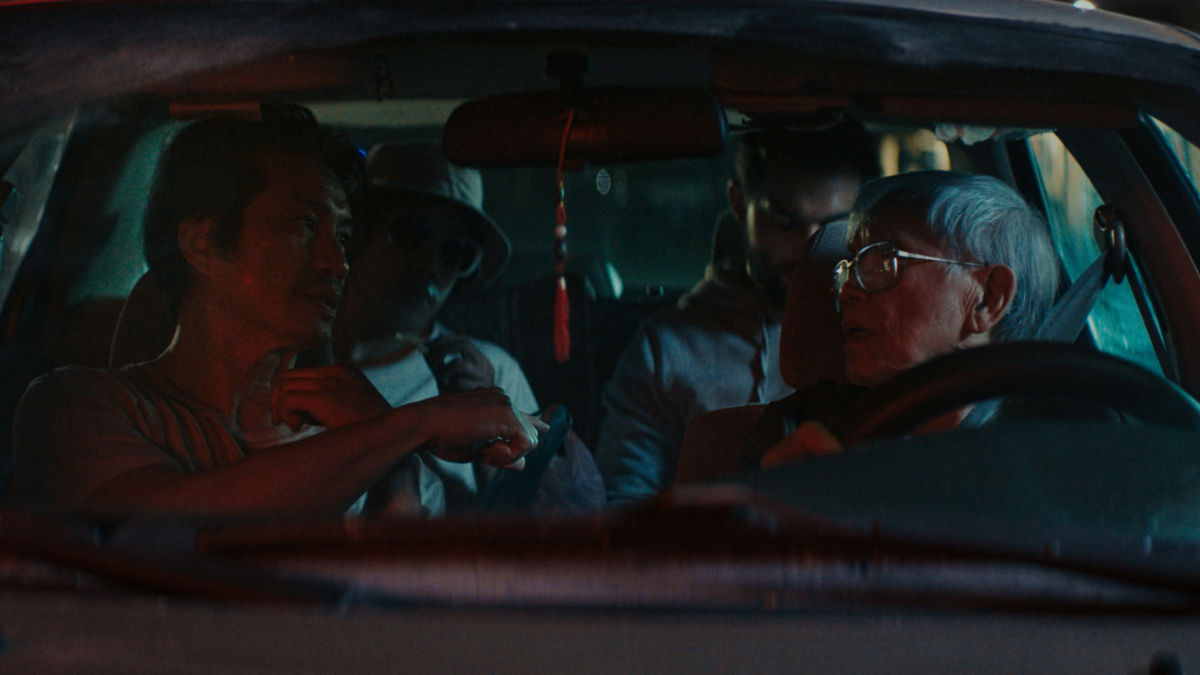Note: Parts of the interview were edited for clarity of content.
When asked about the form of his debut feature film “The Accidental Getaway Driver,” director Sing J. Lee answered that the thriller-drama is at its truest a song; more specifically, a folk song of forgotten people.
Long Ma (Hiep Tran Nghia), the elder Vietnamese protagonist of the film, has certainly been forgotten. Estranged from his family, the cab driver’s decision to take on a last-minute, late-night job is less out of necessity and more out of loneliness. But as he picks up three strangers, Long Ma is thrust into being the accomplice to three prison escapees and their vie to escape the country.
At first glance, one might expect the film to follow a well-trodden path of the on-the-run road film — adapted from a true crime story originally published in GQ, the account of cab driver Long Ma’s Orange County 2016 kidnapping by three fugitives has the makings of a pulpy neo-noir. However, it becomes clear that the film seeks a different kind of representation of the criminal ensemble. Instead, Lee berths toward more tender territory, offering a humanist representation to those not often afforded such in media.

Lee said he considered these factors when he saw the media’s treatment of the true story: “As with anything in the news cycle, it comes out of nowhere. These characters are suddenly thrust into the public consciousness — and then just as quickly as it all happens, it disappears again — but the lives of the real people, they don’t disappear. They’re left to figure it out. There are real people at the heart of it.”
With tenderness in the forefront, the story is driven by the characters and the bonds — and tensions — they form. “The Accidental Getaway Driver” explores the families we come from, and the families we create. Lee allows each character to revel in their origins, further pronounced by the claustrophobic focus of their world: “It was important to create this sense of purgatory for all the characters,” Lee said.
Lee worked with cinematographer and frequent collaborator Michael Cambio Fernandez to extend the sense of purgatory into the visual, the first half taking place almost exclusively at night in interior spaces, surroundings consumed by shadow. In this lacuna, the nonverbal takes on emboldened meanings; Long Ma’s thoughts are given reign in close-up shots, his eyes let loose to communicate. Further insularity is offered in surrealistic dream sequences, where Long Ma inhabits his past memories of family estrangement like a ghost upon the frame.
Within these confines, the bounds of family are pronounced and are able to be constructed along new lines. Language especially serves as a stroke in the larger motions of diaspora. A scene in particular juts out, in which Long Ma and two of his Vietnamese captors — nonchalant but volatile Eddie (Phi Vu) and older, weathered Tây (Dustin Nguyen) — spend an afternoon bonding over a game while laying low in a motel. Their language is at first non-verbal, but as they warm up to each other, the Vietnamese dialogue flows freely and serves as a glue between these individuals so disparate in origin.
Young and raised more distant from his culture, Eddie’s mispronunciation of the word “old” causes him to say the word “dick.” When Tây and Long Ma make fun of him for it, Eddie erupts, shouting at Long Ma, “You’re forgetting your place!” Just like that, the frail potential for a familial bond is ruptured between the two; Tây, on the other hand, comes to Long Ma’s defense, solidifying a father-son relationship dynamic that drives the story forward to its end.
What is clear is that Lee is not afraid to allow his characters to transcend their self-imposed purgatories, a word he uses when speaking on the film. “These characters become less about fact-based people and instead become vessels for themes that can transcend just one experience to be more relatable to a wide spectrum of people,” Lee says. The reason he creates with folktales in mind is twofold: “A folktale exists in oral history, within the memories of people that aren’t often written into the main canon of history — because history is written, skewed to a certain dominating voice, and eliminates some of the other equally important perspectives.”

The second reason stems from the personal: “Folk tales remind me a lot of my family. My paternal grandmother passed as I was writing this. She was Hakka, a nomadic group of Chinese people that a long time ago traveled from the North to the South. They have their own dialect, and so I wasn’t able to communicate with my own grandmother in her native dialect for her whole life. Towards the end, I was in America and she was back in the UK. So with various video conversations translated multiple times through my parents, we started to share fragments of our own stories and lives. And it gave me another perspective on my grandmother because I’ve only heard fragments from other people about her life. So it was interesting to reshape the idea of our family histories from her own past.
“Within the Hakka culture, something that’s known as a pearl of Hakka literature is the folk song. And that’s where familial stories and the history of the community are passed on through song to the next generation. I always think about those memories as songs, that it feels like something that once roared in the chorus of a whole community. But as generations pass it becomes barely a whisper, until suddenly it’s gone. That’s why I called it a folktale of forgotten people.”
When asked what kind of song “The Accidental Getaway Driver” is, Lee smiles, then says: “I see this film as a lullaby. It’s funny because lullabies have sweet melodies, but they’re also about the most tragic things. So yes; on one hand, you might think it’s sweet, but on the other hand, it’s telling you a story of someone going through trials and tribulations and a large array of emotions. And you remember a lullaby for the rest of your life.”
“The Accidental Getaway Driver” screened at the 46th Asian American International Film Festival.

